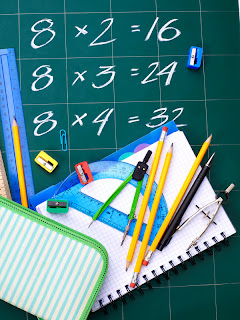Should kids learn times tables?
Knowing that I teach year seven mathematics, people often ask me my opinion on whether kids should learn their times tables (or multiplication tables if you prefer). In this post, I argue that times tables should be learned at some stage of the child's education, but only as part of many ideas related to multiplication.
Firstly, multiplication tables should not be learned too early. My kids' primary school holds off till kids reach grade 3. A kid who "knows the answer" to 3x8 will not feel the need to group objects in threes or in eights and will miss discovering a few things about multiplication:
Firstly, multiplication tables should not be learned too early. My kids' primary school holds off till kids reach grade 3. A kid who "knows the answer" to 3x8 will not feel the need to group objects in threes or in eights and will miss discovering a few things about multiplication:
- The commutative rule: A child is more likely to know that the numbers being multiplied can be reversed without affecting the result if they can remember a time when they found that the same number of counters could be laid out in 8 groups of 3 or 3 groups of 8. Abstractly, 8x3 = 3x8.
- The distributive rule: Kids need to know that 3x15 is the same as 3x10 + 3x5. Better still, they should know that 3x15 is the same as 3x10 + half that amount (since 5 groups contain half as much as 10 groups). This skills will serve them well even after they know their times tables. No child should say, "I cannot tell the answer to 7x17 because we have not been taught the 17 times table."
- A combination of the above two laws: Having worked out the answer to 3x15, a kid should know that finding 3x17 simply involves adding 6, 2 groups of 3, to the previous answer.
- The relationship between multiplication and addition: 3x8 is another way of saying 8+8+8.
- The relationship between multiplication and division: if 4 groups of 6 make 24, then it follows that 24 objects can be separated into 6 groups of 4 or 4 groups of 6.
In high school, I want students to know the first 10 multiplication tables, not because they need split-second recall of these facts, but because they need to be able to identify the factors of a number fairly easily. This skill is key to many areas of school mathematics, such as:
- Simplifying fractions: this requires knowing the highest common factor (greatest common divisor) of 15 and 25 if she is trying to simplify the fraction 15/25; and
- Factorising (factoring): a student needs to know the highest common factor of two or more terms, eg: factorise the expression 8y + 12.
Students who cannot do mental arithmetic are often behind their peers in all areas of mathematics and have lower confidence about their chances of success in the subject. They count on their fingers, a painfully slow process about which they are usually embarrassed in front of their peers.
Those opposed to students learning their tables tend to hold all uses of memorisation in low regard. I disagree with this view. We have memories for a reason and, as long as we are not using memorisation as a substitute for understanding, I do not see the harm in it.
I hope that I have argued my case well: Multiplication tables are necessary but insufficient by themselves. One recommendation I have written on some of students' reports reads:
Sandra should practise the first 10 multiplication tables so that she can identify the factors of numbers up to 100Do you think that kids should learn their multiplication tables by heart?



Comments
missdanielsadventures.blogspot.com.au
Or, when should children learn quadratic equations? Or surds? Or about geometric intuition for the tensor product of vector spaces?
What criteria separates needing to learn to do something from learning something because we might need to? Because it is part of the curriculum? Government expectations? Parent expectations? The need to fill in the school day? Or because we had to learn it when we were at school?
I don't disagree with anything you've written, it is just that you never answered the question as to why anyone needs to learn fractions.... because maybe the answer to how and when comes from there.
As for whether fractions are needed, my answer is yes but certainly not to the extent covered in the school curriculum. I see little point in fraction operations and in mixed numbers. A good sense of partitioning and "equivalent partitions" is much more important.
I want to apologise for not publishing your comment earlier. I had missed the email notification that it was awaiting moderation.
Nothing beyond the 9s are necessary to use the standard multiplication algorithms, and the tens are necessary for understanding the significance of place value. Anything beyond that is, at best, a waste of time.
So I wrote an android application to assist her :)
Each exercise kids solve helps them to feed the cute panda.
You can get daily reminders to feed the panda (solve exercises) and kids get rewarded with trophies upon goals completion.
* Currently the application is only for Android phones *
https://goo.gl/9QutZx